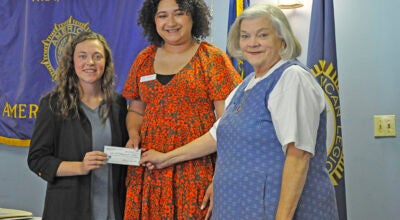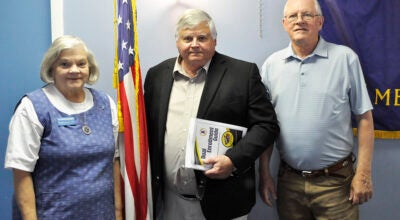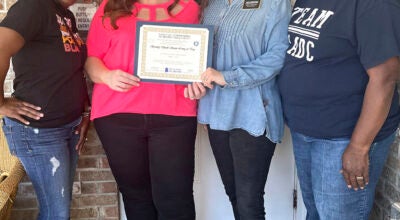Area students take virtual trip from cotton fields to rice fields through ACCESS
Published 7:45 pm Tuesday, May 4, 2010
Students from nine area high schools participated in a Virtual Field Trip on Tuesday and were guided by a veteran of both World War II and the Korean Conflict, Dr. James Ferrell Smith, a native of McKenzie and now a son of Sebring, Fla.
The Virtual Field Trip was hosted by the Troy University ACCESS Center.
Participating schools were Bullock County, Sweetwater, Thomasville, Goshen, Geneva County, Zion Chapel, G.W. Long, Florala and McKenzie.
Smith, a 1944 graduate of McKenzie High School, relayed “untold” stories of going from a cotton field in McKenzie to the rice fields of Korea.
For Smith, it was a long and sometimes almost unbearable journey but one that he “would not take anything in the world for making.”
Smith told of life in rural McKenzie, a “metropolis of about 300.”
“I played a lot of sandlot baseball, sometimes using a Pet Milk can as a ball,” he said. “Other times, we played with a ball made from a wool sock. There was this red oak tree that provided enough shade for a pitcher and catcher to workout on a hot summer day.”
Smith remembered catching a train into Georgiana and, if he had a nickel left after paying a dime for the ride, he might catch a picture show.
Smith played football with a leather helmet that he could fold and stuff in his back pocket. To protect his thighs, he padded his pants with hay.
The only time off from school and work was Saturday afternoon and Sunday. It was a toilsome life.
“We grew our own foodstuff and I developed a taste for collards that I still have today,” he chuckled. “We lived off what we could grow, a milk cow and some hogs. But the hard work prepared us for the future which was one of war.”
Smith was a product of the Depression and the population was in continual movement looking for a way to make money.
Then, the clouds of war cast a shadow of gloom over the country and then there was war and something called the “selective service.”
“All men between the ages of 18 and 46 had to register and, not many men 46 years old were going to be called,” Smith said. “So, if you wanted to get into the branch of service you wanted you had to volunteer. My parents signed for me to go in when I was 17.”
Smith had seen the planes flying in and out of Maxwell Field in Montgomery and fancied himself as a fighter pilot. But his depth perception was so bad that the Air Corps wouldn’t take him. Neither would the Navy nor the Marines.
“I was asked, ‘What’s wrong with the Army and I said ‘a lot of things’ but ‘they’ said, that’s what you are in.’” Smith said with a smile.
He served with pride but admitted that when the Atomic bomb was dropped on Hiroshima and Nagasaki, he celebrated with the other soldiers.”
“I said, ‘hot diggity’ because we had weapon that would not only bring devastation to Japan but to a greater area and President Truman let the world know that he would use it,” Smith said. “If we had invaded Japan we would have lost millions of soldiers because the Japanese were determined to defend their homeland.”
Smith said, like it or not, those who are engaged in war are in the “killing business.
“That’s what an army does,” he said.
Smith told of being stationed in Nevada and seeing the A-bomb tested. Animals were used and experiments conducted to evaluate the effects of the blasts. He saw things that would make your hair curl.
Later he served in Korea and was a part of a different kind of war. A war that would have no end.
“We are under a truce right now and that truce could be broken at any time,” he said. “The seeds of war are planted.”
Smith responded to a student’s question as to whether he would recommend military service for young people today.
“You can get the best technological training in the world in the military,” he said. “They pay you to be trained, the feed you and provide you with insurance and you can go to exotic places. Along the way you might have to ‘pay the piper’ by doing a tour that involves combat but, yes, I would recommend the military.”
Smith is a retired superintendent, history teacher, and professional educator. He has degrees from Troy University, Auburn University, University of Florida, and Nova University.





